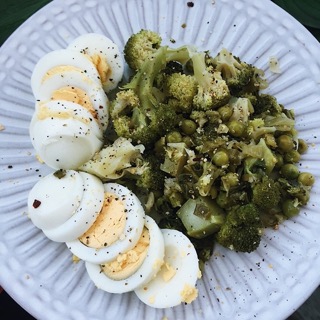Many clients I work with are not eating enough protein at breakfast- are you? Hint: one egg is not enough.

How much protein should I be eating at breakfast?
I’ll get right to it, I recommend eating between 20-40g of protein at breakfast.
For most of my clients, I recommend eating 20g of protein at each meal with an emphasis of loading up at breakfast!
Typical breakfast foods don’t come anywhere close to 20g of protein. For example, a bowl of cereal with 1% milk might get you to about 5-10g of protein.
Why is protein at breakfast is important
Metabolism
Research out of Boston has shown that when we diet by restricting calories, we slow down our metabolism. This then makes any future attempt at weight even more difficult. However, they found that decreasing carbohydrates while eating sufficient protein and healthy fats did not decrease metabolism as drastically as a low fat diets.
Not only does eating enough protein not slow down metabolism, but it can actually increase our metabolism! Eating sufficient protein has been shown to increase thermogenesis, which increases the amount of calories burned.
Weight loss
Protein keeps you feeling full and satisfied. Starting your day with a filling, protein-rich meal, decreases mid-morning snack cravings. Adequate Protein will also keep your blood sugar balanced for steady energy and focus throughout the morning. When our blood sugar spikes, our bodies favor fat storage, making weight loss difficult. Protein helps avoid this.
This goes against our traditional idea of eating less to lose weight! Although it may feel foreign and strange, we now have the research to show that while eating foods like protein, especially at breakfast, may add calories, it can overall help with weight loss.
With all of these benefits, a high-protein breakfast can lead to fewer calories consumed later in the day and few blood sugar spikes. Protein is essential for weight loss.
Aging
As we age, protein becomes even more critical to preserve muscle mass, bone health, and overall vitality. Starting your day with a protein-rich meal helps maintain muscle mass, promoting independence and a high quality of life as you get older.
How to get >20g of protein at breakfast
Protein cheatsheet
(these are approximate amounts and actual grams of protein may vary by brand)
- 1 egg = 7g
- 2 tbsp almond butter/peanut butter = 8g
- 1/2 cup beans (black, kidney, etc) = 8g
- 3oz extra firm tofu = 10g
- 1/2 cup cooked lentils = 12g protein
- One 5.3 oz cup of Greek yogurt = 14g protein
- One 5.3oz cup of cottage cheese = 20g
- 4 slices of deli meat (20g)
- 1 can of sardines (19g)
- 3 oz cooked chicken or turkey (25g)
- 4 oz cooked fish (cod, salmon, etc) (20g)
- One 5 oz can of tuna (35g)
- 4-5 oz lean beef (25g)
- 6 oz of shrimp (20g)
- 2 breakfast sausages (ex: Applegate Breakfast sausage) (22g)
- 2 scoops of Collagen protein powder (20g)
Meal examples
- Breakfast wrap: 2 eggs (14g) + Siete Foods wraps (7g) with avocado and arugula
- Smoothie with 1/2 cup greek yogurt (7g) + 2 scoops protein powder (20g) + fruit + 1 tbsp peanut butter (4g) spinach
- 2 eggs (14g) + 1 breakfast sausage (11g) + sauteed spinach + roasted potatoes
- 1 cup cottage cheese (19g) + berries